A Rear Seat Less Than the Rogue
The cravings of American car buyers for sport utilities, small and large, led Nissan to introduce an all-new model for the 2017 model year, the Rogue Sport subcompact crossover SUV. The automaker was making a bet that the new entry crossover would cling to the coattails of its best-selling vehicle, the larger compact Rogue SUV, and follow in its tire tracks. That’s a tough bet as the junior crossover landed amid a host of subcompact SUVs, including the Honda HR-V, Toyota C-HR, Mazda CX-3, Ford EcoSport and Chevrolet Trax.
While the Rogue Sport was new to the U.S. market, the vehicle it is based on has been on sale in global markets as the Qashqai since 2014. The new small SUV is essentially a shrunken version of the existing Rogue, with a foot less length and a couple hundred pounds less curb weight. It earns its Sport name not for its driving characteristics—it really isn’t sporty—but instead for its positioning in the Nissan lineup below the larger Rogue (as Mitsubishi does with the Outlander and Outlander Sport)
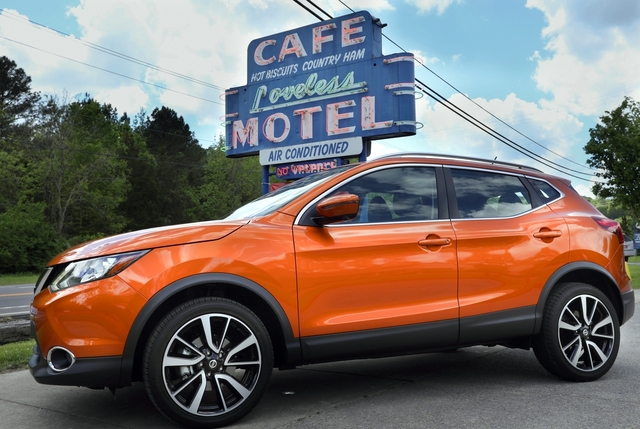
The largest entry so far into the subcompact crossover market, Nissan offers the Rogue Sport in three trims: S ($22,600 base MSRP, including destination charges), SV ($24,200) and SL ($27,300). All-wheel drive (AWD) is a $1,350 option. For 2018 Nissan gave the Rogue Sport only minor tweaks to its optional equipment.
You can have any engine you want in the 2018 Nissan Rogue Sport, as long as it’s Nissan’s 2.0-liter four-cylinder that puts out 141 horsepower. It’s routed to either the front wheels or all four wheels through a continuously variable automatic transmission (CVT). Like others of its ilk, the all-wheel-drive system on this SUV is set up for foul weather and dirt roads, not true off-roading.
EPA fuel economy ratings for our front-wheel drive SL model are 25-mpg city/32 highway/28 combined. All-wheel drive models earn membership in the Clean Fleet Report 30-MPG All-Wheel Drive Club with an EPA rating of 24 city/30 highway/27 combined.
Acorn Didn’t Drop Far from the Tree
Sport has a strong resemblance to big brother Rogue, from the aggressive Nissan V-Motion grille, to the swoopy hatchback-like rear along with sleek LED boomerang-shaped taillights and rear spoiler. From the side, the Rogue Sport looks tidy and tightly styled, thanks to touches like the up-kick in the rear side glass, fog lights and available 19-inch wheels.
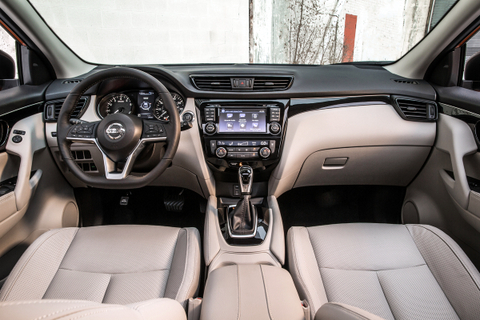
Inside, the interior is lifted almost wholesale from the updated 2017 Rogue. Gauges are simple and clear, and the dash has nice, intuitive round knobs for audio and climate control that frame the usual center stack with a touchscreen. Front and rear seats are equally comfy and well-cushioned and seem perfectly shaped for adult-size backsides.
With a large glovebox, a spacious center console armrest bin, and wide door pockets, the Rogue Sport offers plenty of places to stash smaller items throughout the cabin. In the cargo area there are two bins on either side and an impressively large storage bin under the cargo floor. Space for cargo is 19.9 cubic-feet behind the folding seatbacks; 53.3 when they are folded.
Targeted at young, tech-savvy buyers, it’s surprising to find the 2018 Nissan Rouge Sport doesn’t offer Apple CarPlay or Android Auto. Plus, rear-seat passengers won’t be thrilled by the lack of USB or charging ports for their mobile devices. The choice is, juice up before heading out or, for $80 Nissan dealers can install two USB charging ports on the back of the center console.
And since I’m carping, there is a row of hard-to-reach buttons, like traction control and steering-wheel heat, for example, that are located so far to the lower left of the dash that even seasoned owners will need to take their eyes off the road to find them.
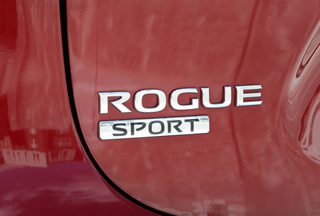
Basic infotainment gear is standard in the Rogue Sport. A 5.0-inch color display in the S and SV models provides a clear readout for the audio system. The base 2018 Nissan Rogue Sport S comes standard with Bluetooth phone integration with Siri eyes-free, a rearview camera and Nissan’s clever Easy Fill Tire Alert, which honks the horn once the tire pressure has reached the correct level. You also get air conditioning, manual cloth seats, remote keyless entry and cruise control.
The mid-level Rogue Sport SV adds larger 17-inch alloy wheels, roof rails, push-button start, a six-way-power driver’s seat, and dual-zone climate control. The top-level SL gets 19-inch wheels, fog lights, remote start, Nissan’s Around-View Monitor bird’s-eye-view camera system, navigation, leather on the shift lever and heated steering wheel and seats. Basic safety systems are standard, but you’ll have to step up to mid-level SV trim to add forward emergency braking, and top SL if you want lane departure warning.
A Great Urban Driver
Forward visibility is great, thanks to a high seating position and relatively thin A-pillars. Glass areas are large and square, providing views from most angles. To help with the blind spots that do exist, Nissan has fitted the Rogue Sport with extra-large side-view mirrors.
The bucket seat in our top-of-the-line SL model was perfectly acceptable for a three-hour drive, but the 2018 Nissan Rogue Sport shows off its best in urban areas where its size is perfect for scooting around crowded cities and fitting tight parking spots. Around town, the junior crossover doesn’t lack for power, and is peppy enough to squirt in and out of traffic without being a hazard.
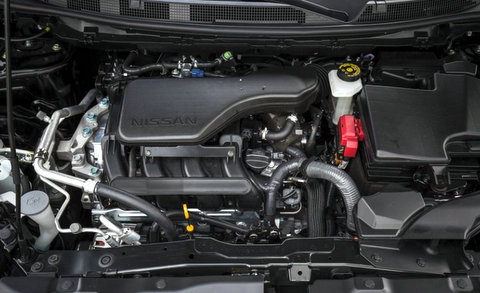
The chassis holds up its end of the bargain, its balanced European breeding shining through. The suspension rebounds quickly, and minor bumps are absorbed with very little disturbance sent through to the cabin; harsher impacts are felt, but they are surprisingly gentle. The light steering does at least make the Rogue Sport particularly easy to maneuver at low speeds, such as in a parking lot or driveway.
In town I was left thinking this thing is perky and light on its feet. But when I hit an on-ramp to the freeway, I was wishing for an extra 50 horsepower or so. A sluggish 0 to 60 time of 10 seconds tells the story. The slowness, to be fair, is similar to that of several other small SUVs, including the competing Honda HR-V and Toyota C-HR.
Once up to speed, steering was a touch slow and on the disconnected side, but the Rogue Sport did what it was told without much fuss. Aside from the creamy ride quality, handling was competent but hardly sporty. The vehicle was quiet inside under most circumstances on all but coarser pavement surfaces. When I pushed hard into corners, the CVT held a gear until I reached a straightaway, long enough that the only way to continue accelerating was to adjust the ratio. That action was manually via the shift lever—there are no shift paddles—but the sluggish result was essentially the same.
That said, the Rouge Sport did live up to its fuel economy rating. We returned the keys to Nissan after driving 370 miles that showed a combined fuel economy of 28.4 mpg.
The Subcompact SUV For You?
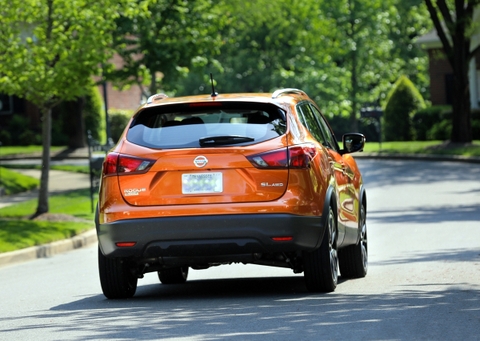
Acceleration isn’t great, with driving dynamics focused more on comfort than excitement, but the 2018 Nissan Rogue Sport makes up for these shortcomings with excellent cargo-hauling capability, a smooth ride, and above-average fuel economy. As a family car, the Rogue Sport also excels with plenty of rear-seat space for a child seat and a host of available active safety features—although most of these are limited to the expensive SL model.
Whether you’re a new parent shopping for a kid-friendly crossover or an empty nester looking to downsize from a larger SUV without giving up too much utility, the Rogue Sport deserves consideration.
Related Stories You Might Enjoy—More Competition in this Class
Road Test: 2016 Honda HR-V
Road Test: 2018 Toyota CH-R
Road Test: 2018 Mazda CX-3
Road Trip: 2018 Ford EcoSport
Road Test: 2018 Mitsubishi Outlander Sport
Road Test: 2015 Chevrolet Trax
Road Test: 2016 Fiat 500L
Road Test: 2016 Fiat 500X
Disclosure:
Clean Fleet Report is loaned free test vehicles from automakers to evaluate, typically for a week at a time. Our road tests are based on this one-week drive of a new vehicle. Because of this we don’t address issues such as long-term reliability or total cost of ownership. In addition, we are often invited to manufacturer events highlighting new vehicles or technology. As part of these events we may be offered free transportation, lodging or meals. We do our best to present our unvarnished evaluations of vehicles and news irrespective of these inducements.
Our focus is on vehicles that offer the best fuel economy in their class, which leads us to emphasize electric cars, plug-in hybrids, hybrids and diesels. We also feature those efficient gas-powered vehicles that are among the top mpg vehicles in their class. In addition, we aim to offer reviews and news on advanced technology and the alternative fuel vehicle market. We welcome any feedback from vehicle owners and are dedicated to providing a forum for alternative viewpoints. Please let us know your views at publisher@cleanfleetreport.com.

9 thoughts on “Road Test: 2018 Nissan Rogue Sport SL AWD”